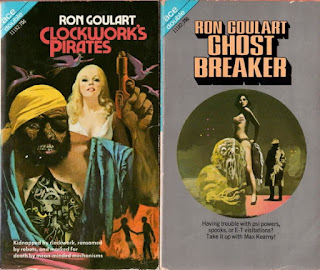A review by Rich Horton
Ron Goulart turns 86 today -- a surprise to me, I'd have thought him rather younger. In his honor, then, a review of his only Ace Double.
 |
| (Covers by Karel Thole) |
Clockwork's Pirates is set in a future Goulart has used a number of times, concerning the "Barnum System" of planets. This novel is set on Esmeralda, a planet purposely kept at a low level of technology. John Wesley Sand is a freelance secret agent, and is hired by the Barnum authorities to help track down criminals who have kidnapped a local governor's daughter, and who have also eliminated some previous agents. It is suspected that they may be using robots -- which are obviously enough illegal tech.
Sand rather discursively makes his way after the kidnappers, mostly in the company of a hack novelist named Tony Dehner. He also gets help from a mysterious woman who claims to be the daughter of a wizard. And to be sure he doesn't hesitate to enjoy the company of various other women on the way. The actual chase of the kidnappers is not terribly interesting -- Goulart pretty much just makes stuff up as he goes along. I was particularly annoyed by the fact that this nominally SFnal future is actually a fantasy world -- blatant magic is a major feature. For no particular reason except that it makes the author's job easier. It must be said that there are occasional cute touches and amusing bits, and that it all reads smoothly enough. But the novel is totally unmemorable.
Ghost Breaker is a collection of stories all featuring the same character, Max Kearny. Max is an adman who is also an occult investigator. Goulart's stories about him appeared mostly in F&SF throughout the '60s. It is worth noting that Goulart himself worked as an ad man, was born the same year (as far as I can tell) as his character Max Kearny, and lived in pretty much the same place.
The stories follow a broadly similar template -- Max reluctantly agrees to investigate an occult happening for a friend of his. These happenings are always truly fantastical, not Scooby Doo style chicanery (though magical chicanery may be involved). Max manages to figure out what's going on (often too easily) and foil things, usually by looking up a spell in a book -- always too conveniently. Max gets married along the way, and his wife (something of a witch) tends to try to help out and tends to put herself in danger.
That description, I guess, makes it clear that I didn't love these stories. But they are not awful -- Goulart's telling is just engaging enough to hold the interest. The stories aren't exactly funny -- they don't seem intended to be truly comic -- but they are light and amusing enough. Not a one of them is outstanding -- nothing here is brilliant -- but they do seem, well, acceptable. Which in a way describes Goulart's career -- I have been reading him off and on for decades, and I find him fitfully funny -- sometimes tiresome, sometimes OK, and every once in a while, as with a story this year in F&SF, pretty darn amusing. But never, for me, brilliant. (That said, comedy in particular is something that strikes different people in very different ways.)
Here's a list of the stories in Ghost Breaker, with lengths and original publication venues:
"Please Stand By" (8400 words) (F&SF, January 1962)
"Uncle Arly" (3600 words) (F&SF, July 1962)
"Help Stamp Out Chesney" (4300 words) (first published in this collection)
"McNamara's Fish" (6500 words) (F&SF, July 1963)
"Kearny's Last Case" (4300 words) (F&SF, September 1965)
"Breakaway House" (3800 words) (F&SF, May 1966)
"The Ghost Patrol" (5400 words) (F&SF, October 1968)
"The Strawhouse Pavilion" (4500 words) (Coven 13, January 1970)
"Fill In the Blank" (5800 words) (F&SF, May 1967)
No comments:
Post a Comment